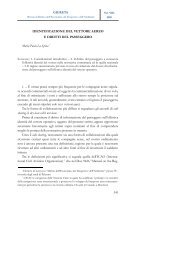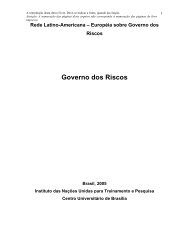The Old and the New Limits to Freedom of Contract in Europe
The Old and the New Limits to Freedom of Contract in Europe
The Old and the New Limits to Freedom of Contract in Europe
Create successful ePaper yourself
Turn your PDF publications into a flip-book with our unique Google optimized e-Paper software.
ERCL 2/2006 <strong>The</strong> <strong>Old</strong> <strong>and</strong> <strong>the</strong> <strong>New</strong> <strong>Limits</strong> <strong>to</strong> <strong>Freedom</strong> <strong>of</strong> <strong>Contract</strong> <strong>in</strong> <strong>Europe</strong><br />
267<br />
ciprocal social responsibility. 30 It shows a stronger ethical <strong>in</strong>spiration, which<br />
is reflected <strong>in</strong> a new conceptualisation <strong>of</strong> <strong>the</strong> limits <strong>of</strong> freedom <strong>of</strong> contract.<br />
This tendency has been epi<strong>to</strong>mised by <strong>the</strong> German Federal Constitutional<br />
Court, which re<strong>in</strong>terprets freedom <strong>of</strong> contract accord<strong>in</strong>g <strong>to</strong> <strong>the</strong> follow<strong>in</strong>g<br />
pattern. First, <strong>the</strong> mak<strong>in</strong>g <strong>of</strong> a contract is <strong>to</strong> be controlled (<strong>and</strong> eventually restricted)<br />
by <strong>the</strong> state as long as weak parties confront strong parties. This implies<br />
<strong>the</strong> identification <strong>of</strong> weak parties <strong>in</strong> relation <strong>to</strong> strong parties: women<br />
are weak <strong>in</strong> relation <strong>to</strong> men, <strong>the</strong> poor are weak <strong>in</strong> relation <strong>to</strong> <strong>the</strong> middle <strong>and</strong><br />
upper classes, wives are weak <strong>in</strong> relation <strong>to</strong> husb<strong>and</strong>s, young people are weak<br />
<strong>in</strong> relation <strong>to</strong> grown-ups, children <strong>in</strong> relation <strong>to</strong> parents, etc. Second, <strong>the</strong><br />
mak<strong>in</strong>g <strong>of</strong> a contract is <strong>to</strong> be restricted when <strong>the</strong>re are a weak <strong>and</strong> a strong<br />
party <strong>and</strong> unfair contractual terms. Here comes <strong>the</strong> fundamental rights argument<br />
<strong>and</strong> – third – <strong>the</strong> <strong>in</strong>tervention <strong>of</strong> <strong>the</strong> state <strong>in</strong> terms <strong>of</strong> limits <strong>to</strong> freedom<br />
<strong>of</strong> contract is required because <strong>the</strong> unfair contract disregards <strong>the</strong> weak party’s<br />
fundamental rights.<br />
This set <strong>of</strong> arguments is deployed <strong>in</strong> two renowned cases concern<strong>in</strong>g, respectively,<br />
a family guarantee (1993) <strong>and</strong> a prenuptial agreement (2001). In <strong>the</strong><br />
first case <strong>the</strong> deb<strong>to</strong>r’s young (<strong>and</strong> poor) daughter confronts a big bank; <strong>in</strong> <strong>the</strong><br />
second a pregnant woman, who already has a child, has <strong>to</strong> choose between<br />
ei<strong>the</strong>r gett<strong>in</strong>g married after subscrib<strong>in</strong>g <strong>to</strong> a marital support waiver or rais<strong>in</strong>g<br />
two children on her own.<br />
In both cases <strong>the</strong> FCC identifies a typical structure <strong>of</strong> <strong>in</strong>equality <strong>of</strong> barga<strong>in</strong><strong>in</strong>g<br />
power. In both cases <strong>the</strong> bonus mores clause (§ 138 BGB) is enforced <strong>in</strong><br />
order <strong>to</strong> fulfil <strong>the</strong> constitutional dignity <strong>of</strong> freedom <strong>of</strong> contract: this will be<br />
defeated every time <strong>the</strong> very notion <strong>of</strong> freedom <strong>of</strong> contract does not correspond<br />
<strong>to</strong> <strong>the</strong> right <strong>to</strong> self-determ<strong>in</strong>ation (Article 2 Basic Law) <strong>of</strong> both contractual<br />
parties. In <strong>the</strong> end <strong>the</strong> disregard <strong>of</strong> <strong>the</strong> weak party’s fundamental<br />
rights is what reveals <strong>the</strong> abuse <strong>of</strong> freedom <strong>of</strong> contract.<br />
<strong>The</strong> FCC’s <strong>in</strong>terpretation <strong>of</strong> freedom <strong>of</strong> contract is strongly distributive: <strong>the</strong><br />
strong party has <strong>to</strong> make concessions <strong>to</strong> <strong>the</strong> weak party, for <strong>the</strong> good <strong>of</strong> <strong>the</strong><br />
weak party <strong>and</strong> so freedom <strong>of</strong> contract becomes <strong>the</strong> vehicle through which<br />
<strong>the</strong> state enacts solidarity with<strong>in</strong> <strong>the</strong> community. But <strong>in</strong> contrast with <strong>the</strong><br />
1970’s approach, solidarity is strongly tied <strong>to</strong> <strong>the</strong> rhe<strong>to</strong>ric <strong>of</strong> human rights<br />
<strong>and</strong> human dignity. <strong>Freedom</strong> <strong>of</strong> contract is now <strong>to</strong> be reassessed with<strong>in</strong> <strong>the</strong><br />
framework <strong>of</strong> constitutional values. <strong>The</strong> social <strong>in</strong>terpretation <strong>of</strong> <strong>the</strong> limits <strong>to</strong><br />
freedom <strong>of</strong> contract shifts from a concern for social <strong>in</strong>equalities (better than a<br />
30 Kennedy, n 28 above.



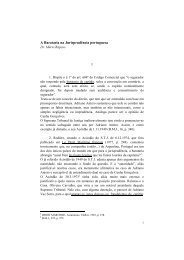



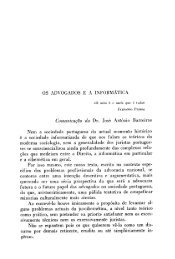
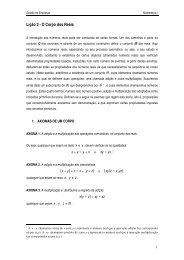

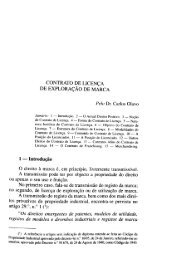
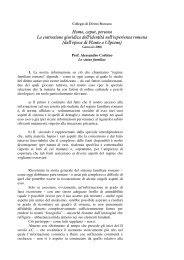
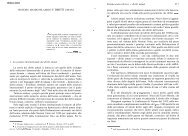

![Luigi Sapio Nozione di islām La parola “islām” [ ] è il mas.dar1 ...](https://img.yumpu.com/15836073/1/185x260/luigi-sapio-nozione-di-islam-la-parola-islam-e-il-masdar1-.jpg?quality=85)
